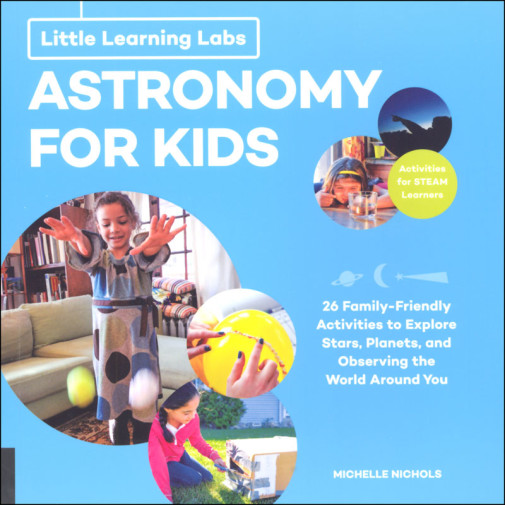We use cookies to make your experience better. To comply with the new e-Privacy directive, we need to ask for your consent to set the cookies. Learn more.
Little Learning Labs: Astronomy For Kids
Help children grasp astronomical concepts about our solar system with this hands-on lab experiment manual. Assisted by picture demonstrations throughout, these experiments are designed to help bring physics and astronomy down to a child's level without “dumbing down" the information given. The beginning of the book starts with activities on how to observe, and then covers the realization of the sun and planet movements. These projects are fun and entertaining enough to involve the entire family or classroom, giving information that people of any age can walk away having learned something new. Many of these projects can be accomplished by children, but several involve concepts or necessary objects that may need adult explanation or supervision (especially when scissors, sharp objects, or heat are involved). A great supplement for students learning about astronomy in curriculum programs or unit studies.
Little Learning Labs: Astronomy for Kids teaches children the wonders of outer space with 26 hands-on activities that can be done at home with items found around the house.
It's not easy to explain and understand what lies beyond the night sky. This curated collection of 26 projects from the bestselling Astronomy Lab for Kids introduces children to the basics of outer space through 26 hands-on labs that can be completed with everyday items from around your house. It's the perfect resource for teachers, homeschool families, and community groups.
Mini astronomers will learn about things such as the size and scale of planets using sandwich cookies and tennis balls, how to measure the speed of light with a flat candy bar and a microwave, how to make a simple telescope with magnifying glasses, and so much more. Kids of all ages and experience levels will love completing these hands-on labs with the guidance of adults.
Why wait to introduce children to the expansive wonder of the skies, when Little Learning Labs: Astronomy Lab for Kids can put it within their reach today?
Focusing on topics children are naturally curious about, this practical series offers a variety of hands-on projects that use household items. Divided into units, activities begin with a material list, safety tips, and step-by-step instructions. Concluding the activities are creative enrichment suggestions and the science behind the activity. Includes full-color illustrations.
| Product Format: | Paperback |
|---|---|
| Brand: | Quarry Books |
| Author: | Michelle Nichols |
| Grades: | 1-5 |
| ISBN: | 9781631595608 |
| Length in Inches: | 7.5 |
| Width in Inches: | 7.5 |
| Height in Inches: | 0.25 |
| Weight in Pounds: | 0.45 |

